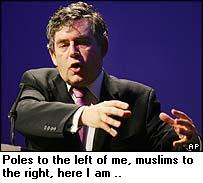The primary school that my children go to has a School Council which gets the kids involved in how the school is run and even how some of the money is spent.
Last year the children who wanted to take part stood for election and were voted in by their peers. However, next year (this is school years obviously, starting in September) they have decided that the current Chair will remain as Chair even if their peers vote for someone else.
Their “constitutencies” are individual classes so a whole class of children will be deprived of the right to vote for their representative on the School Council.
This is bad enough in it itself but what makes it worse is that for months, the Chair has been bullying one of my children quite badly. She is, to put it bluntly, an obnoxious child with a very real attitude problem. The mental abuse was so bad she had several sessions with teachers to talk to her about what she was doing and it took several attempts to get her to stop. This is a role model for other children in the school.
I’ve sent the following email to the Deputy Head of the school:
Dear Mr xxxxxxx,
[My Child] has been talking to us about School Council, in particular the fact that it has been decided that [The Bully] will be chair of the School Council again next year even if her peers don’t vote for her. [My Child] feels that it’s unfair and so do we.
For the last few months [The Bully] has been bullying [My Child] so badly that he couldn’t sleep and was sitting in his room crying. She has had sessions with teachers to talk to her about mental abuse and bullying. I believe she still has some sort of anti-bullying role in school which I find quite ironic. That’s not a good role model for other children.
This year the School Council was elected by the children – an excellent practical demonstration of democracy at work. Next year [The Bully] will be the chair again, even if her peers don’t want her to be. What does that teach the children? That the wishes of the majority can be disregarded by the privileged few? A sad reflection of real life, I’ll grant you, but perhaps if our children were instilled with some sense of how democracy should work, in a couple of decades they might be the ones who make it work in real life?
If [The Bully] gets elected to the School Council then fair enough but if her behaviour towards her peers over the last year resulted in them not voting for her again then that will teach her that actions have consequences – a valuable lesson for a 10 year old child, especially one that has a predisposition towards bullying.
School Council was such a good idea but this has spoilt it.
Stuart
Obviously, I’ve removed the names because it’s kids involved. Is this what our kids should be told? Democracy is a privilege that can be taken away on a whim and the consequences of bullying is more privilege and responsibility?


 Technorati Tags:
Technorati Tags:  According to a report by the London School of Hygiene and Tropical Medicine,
According to a report by the London School of Hygiene and Tropical Medicine,  A cross-party committee of Lords has called for a cap on immigration after saying that immigration in the last 10 years has had little or no benefit to the existing population.
A cross-party committee of Lords has called for a cap on immigration after saying that immigration in the last 10 years has had little or no benefit to the existing population. A passenger sevice between Ebbw Vale and Cardiff
A passenger sevice between Ebbw Vale and Cardiff 